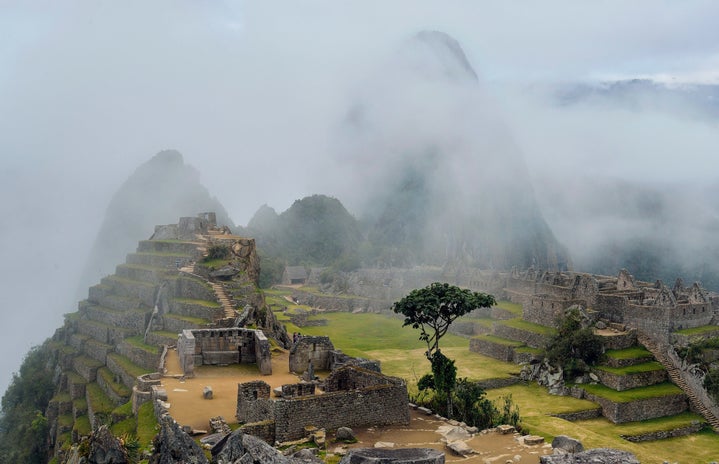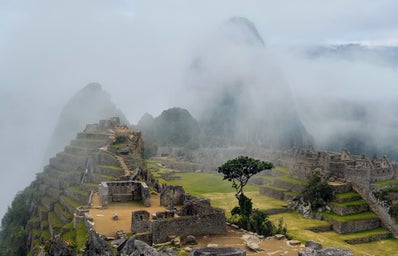The difference between race and ethnicity can often be dismissed and overlooked as the media uses such words interchangeably. While they both consider common ancestry, race is primarily unitary and socially imposed — a system that has profound social consequences primarily governed by one’s unique physical attributes. Even as society strays away from the binary of race and towards a means of self-identification, I still always hesitate whenever someone asks me where I’m from. A combination of Peruvian and Canadian-Norwegian genes, all in one, just to make me a complete gringa. The type of person that most may initially see me as I don’t feel connected to at all. And honestly, I feel like I’ve learned a lot in my childhood through experiences related to my mixed ethnicities — some were positive and some were negative.
Since my mother tongue was Spanish, I struggled with certain aspects of speaking English, specifically in the usage of pronouns in kindergarten. I’d often confuse the pronouns “he” and “she” and had to undergo speech therapy. Nonetheless, living in Canada and having an English-speaking father at home slowly started to pick away at my Spanish, so much so that my mama started to teach me Spanish at home. I hated it at the moment, but the ability to speak Spanish now is incredibly special and validating to me. As I’m not super close with my dad’s side of the family, being able to securely communicate with my Spanish relatives is essential for me to maintain family relationships and support systems.
I visited Peru quite often in my childhood, specifically the northwestern city of Trujillo where most of my family resided. Housing historically significant ruins such as Chan Chan (home of the Indigenous Chimu civilization before falling to the Incas), as well as the beautiful Plaza Mayor de Trujillo, (where the independence of Trujillo from Spain was declared in 1820 and was the first Peruvian city to do so) Trujillo is a rich city full of dance, life, history, and food. Traveling from one relative’s home to another, a major part of my childhood was experienced in this quite different world from where I grew up in the suburban city of Oakville, Ontario. Although I lived in one part of the world, my heart felt like it belonged to another. Cultural expectations and norms integrated with my home life in Canada, which I believe has influenced my personality and values to this day.
Growing up, I had not formed the identity that I now carry with me today, and therefore, it was difficult to find a place that I felt I belonged to outside of my home. My Hispanic identity was heavily watered down when I tried to connect with my Latino peers and sometimes was even dismissed. With my white complexion and accent, I was sometimes called “fake” or “gringa” (which I view as a term of endearment from my family, but not when it’s used to dismiss my identity). I’ve even had a Latina mother tell her daughter, a close friend at the time, that my Spanish was horrible, just because of my accent and loss of vocabulary every now and then. On the opposite end, I never truly felt comfortable or understood in a group of white peers either. No one could relate to the food I ate or my cultural customs, which made me feel often isolated from others.
Despite a few negative experiences, I wouldn’t change my mixed ethnicity for the world! I can’t imagine being who I am today without the influence of my culture and experiences in Peru. There are many positive parts of being a mixed Latina as well, a funny one being people speaking Spanish around me without knowing I speak it as well. I remember when I was around 12, I was outside my hip-hop classroom, waiting for the previous class to finish so that I could go in. A girl in my class sat next to her mother waiting as well, and I didn’t think much of them at first until they started speaking Spanish. It was random subject matter at first, but then they started to talk about me! I can’t remember exactly what they were talking about, but I remember little me hiding a smirk, wondering if I should say something back…(I didn’t)!
Although Peru is a beautiful country with an astonishing history and food, it is still a South American country that suffered and still suffers from political conflict and high rates of crime. Especially recently, civil unrest and terrorism have heightened after Pedro Castillo, former President of Peru, was removed from office by Congress in December of 2022. I’ve seen the extreme lows of poverty, I’ve almost been lured away by two men, and I’ve heard of the hardships that my mama’s family went through. Peru did not keep me sheltered, and I’m honestly thankful. I’m grateful for the different perspectives and experiences I have in a world that might not be as privileged as my home in Ontario, but that allowed me to grow up to be thoughtful, considerate, and kind.
If you’re going to take away something from this article, let it be this: race and ethnicity, although correlated, are not the same. The power of discovering your cultural identity is essential, and race can oftentimes control and confine human expression in a labeled box. Self-identification has been of utmost importance in our globalizing and diverse world, as binaries deconstruct and human expression builds. And in this last sentence, I feel as though I’ve weaved the last thread in the healing of my unique Latina identity. Viva Peru!


